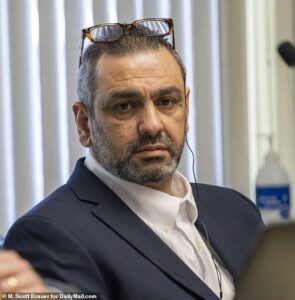
A father accused of trying to strangle his teenage daughter in a Muslim ‘honor k!lling’ has been jailed for almost three years in the US….CONTINUE FULL READING>>>>>
Ihsan Ali, 44, was charged with second-degree attempted murd£r alongside his wife Zahraa Subhi Mohsin Ali, 40, over the October 18, 2024, attack.
A Thurston County Superior Court jury found them not guilty on July 31, but convicted Ihsan of lesser charges against his daughter, Fatima Ali.
Ihsan was jailed for 14 months for second-degree assault, 12 months for unlawful imprisonment, and 182 days for fourth-degree assault.

He was also ordered to complete a parenting class, do 18 months of community service, and have no contact with his daughter for 10 years.
Judge Christine Schaller blasted Ihsan for his ‘horrific actions’ including the ‘vicious assault on Fatima’ outside Timberline High School in Lacey, Washington.
The judge said she gave him maximum sentences because of the brutality of the crime and that Fatima was under Ihsan’s care as his daughter.
She said of his assault on Fatima’s boyfriend: ‘He victimized a defenseless young man for no reason, and it is Isiah’s good fortune that he was not more badly injured.’
Judge Schaller also sentenced Zahraa for breaching a restraining order, which she already served in pretrial detention.
Ihsan spent the past almost 10 months behind bars since his arrest days after the attack and will be credited with time served. Zahraa was released on July 31.

Zahraa cried as Fatima, now 18, read an emotional victim impact statement to the court before the sentencing, calling Ihsan a ‘monster’ who tried to kill her with his own hands.
Fatima told police she ran away from home to after her parents tried to put her on a plane to Iraq.
‘Her father had recently been threatening her with honor k!lling for refusing an arranged marriage with an older man in another county,’ the initial police press release alleged.
But this claim, central to the prosecution’s original case last year, was completely absent from the three-week trial last month, by court order.
Jurors were shown horrifying video of Ihsan grabbing Fatima by the throat before putting her in a chokehold on the ground outside the school.
‘Her face was looking pale and her eyes were starting to roll back,’ Isiah, who was just 16 at the time, told the court through tears as he gave evidence.
Other students described how Fatima ‘couldn’t breathe’ her ‘lips were turning purple’ and she grabbed at her father’s arm in ‘obvious distress’.
Josh Wagner, a motorist who stopped his car in the middle of the road and ran to help, said her face was ‘changing color… she was gonna lose consciousness if it continued’.
Fatima herself took the witness stand and testified that she lost consciousness four times and was terrified that she was going to d!e.
The jury also heard that after Isiah, her classmates, and Wagner freed her by punching and kicking Ihsan dozens of times, Zahraa tried to finish the job.
‘When she (Fatima) got away from her father, she tried to run, and her mom had grabbed her and she was grabbing her by the throat,’ one classmate testified, as did other witnesses.
The jury had to be satisfied, beyond reasonable doubt, that Ihsan and Zahraa intended to kill their daughter when they choked her.
They weren’t, and entered not guilty verdicts after three days of deliberation.
Prosecutors were hampered by the collapse of the ‘honor killing’ claim that served as a powerful motive for the jury to convict.
Deputy Prosecutor Heather Stone made it clear in a memorandum in the leadup to the trial that the state would no longer rely on it, and she wasn’t sure how it became such a big feature of the case.

‘There is no express evidence that such was the motivation of either defendant in this case, and the state does not intend to argue such,’ she wrote.
‘Further, the state has no intention of even using the term at trial.’
Fatima is in extended foster care and, now an adult, cannot be compelled to return to her parents…..CONTINUE FULL READING>>>>>


